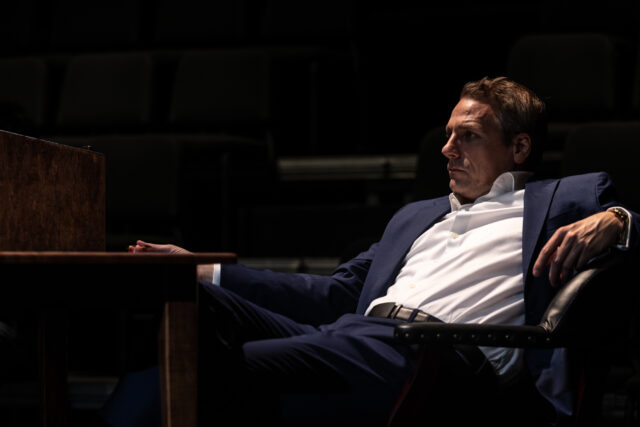
c/o wesleyan.edu
On Feb. 18, 1965, conservative American public intellectual and writer William F. Buckley and American writer and activist James Baldwin went head-to-head in a debate at the University of Cambridge. The motion for the debate was “The American dream is at the expense of the American Negro,” with Baldwin arguing for and Buckley against the motion. Last week, on Thursday, Feb. 24 and Friday, Feb. 25, the Elevator Repair Service (ERS) theater ensemble reenacted the debate in the Ring Family Performing Arts Hall, inviting us to reengage with the debate in 2022.
After 57 years, the famous debate remains an integral part of modern political discourse about the experiences of Black Americans in the United States. In the wake of a global pandemic and the disproportionate impact of police violence on the Black community, these questions are more important than ever, motivating us to think about how far we have truly come since Buckley and Baldwin took the debate stage.
Elevator Repair Service, founded in 1991 by Artistic Director John Collins, aims to explore a range of subjects and engage with non-traditional literary forms through performance. In the past, these performances have ranged from productions of “The Sound and the Fury” to full-length readings of “The Great Gatsby.” The decision to recreate the Baldwin-Buckley debate in front of a live audience came before the pandemic was even a thought in our minds, yet its timing seems more relevant than ever.
“Theater is kind of an act of witnessing something,” Collins said. “[It’s different] to hear [the debate] live to be witnessed by an audience. It’s that simple contract, like, you’ve come to watch us, we’re going to do something for you. So I think that we heard all these contemporary resonances the first time we listened to [the debate]. So, you know, I think [the debate resonates] so easily now that it deserves to be heard out loud. I mean, for good and bad reasons. The good reasons are that what Baldwin says is so central, so necessary, and it’s so sad in a way too, that people still need to hear that. [At the same time,] part of the reason you can’t just write off [Buckley] is that his arguments haven’t gone away either.”
Before coming to Wesleyan, the company had performed the debate once before in front of an audience in Philadelphia. Interestingly enough, the performance at the University marked the first time ERS had reenacted the debate in front of an audience of college students, mirroring the setting of the original. Surrounded by a packed audience of students, at a time when Black Americans were effectively excluded from their rights as citizens of the United States, Baldwin and Buckley laid out their arguments.
“There are a lot of [moments] in [Buckley’s] speech that refer to the audience as students at a university,” Collins said. “So that makes slipping back and forth between the past and the present work really nicely.”
In the backdrop of protests over the unjust killings of George Floyd and Breonna Taylor, the performance does more than just revitalize the debate between Baldwin and Buckley.
“The message that came out in 1965 regarding what [Baldwin] has to say about race and the participation of Black people in the creation of this country is still relevant today,” actor Greig Sargeant, who plays Baldwin, said. “It affects every single aspect of our life [whether it be] education, healthcare, or housing. [Black people are] still treated like second-class citizens.”
Sargeant hopes to continue to highlight Baldwin’s message today.
“Doing the speech now and performing it to people your age, you can make a difference for the future,” Sargeant said. “The world belongs to you now.”
To Sargeant, representing Baldwin in front of a live audience marks a magnificent moment in his career as an actor.
“[It has been] extraordinary,” Sargeant said. “One of the major reasons why I got into theater at a very young age was because I felt like I had no voice. [But] the theater gave me a voice.”
The company is set to perform in Los Angeles, at Williams College, and in Antwerp, Belgium in the next month, where they hope to continue shedding light on the importance of the Buckley-Baldwin debate today.
Jo Harkless can be reached at jharkless@wesleyan.edu
Comments are closed